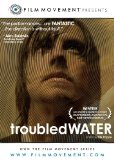| Reviews & Columns |
|
Reviews DVD TV on DVD Blu-ray 4K UHD International DVDs In Theaters Reviews by Studio Video Games Features Collector Series DVDs Easter Egg Database Interviews DVD Talk Radio Feature Articles Columns Anime Talk DVD Savant Horror DVDs The M.O.D. Squad Art House HD Talk Silent DVD
|
DVD Talk Forum |
|
|
| Resources |
|
DVD Price Search Customer Service #'s RCE Info Links |
|
Columns
|
|
|
Troubled Water
Film Movement // Unrated // February 9, 2010
List Price: $24.95 [Buy now and save at Amazon]
The Film:
Coming to grips with past mistakes and making peace with transgressions, whether someone's entirely guilty of them or not, are themes that have been explored extensively in various forms throughout cinema. The ability to ceaselessly dissect this topic perpetuates on the individuality within each story, creating different challenges -- both physical and internal -- for those re-emerging into society to react against. Troubled Water (DeUsynlige), Erik Poppe's examination into the mind of a man recently released from prison, also integrates an outlook on religion and the fervor of maternal instinct within its challenging sketch of post-trauma piousness. And it's exceptionally handled, backdropped with musical elegance and a daring point-of-view.
The screenplay, written by Harald Rosenløw-Eeg, riffs on a story that'll seem familiar to those who have seen the likes of American History X or Boy A, with melancholy happenstance echoing Mean Creek as its driving force. It's about Jan (Pål Sverre Valheim Hagen), otherwise known to us by his middle name Thomas, who has recently taken a job as an organ player after his release from prison. His reason for being in jail is somewhat murky, but we're aware that an accident along the bank of a river made him, and his friend, responsible for the death of a young boy. We're led to believe that the church had its reluctance in taking in the ex-convict until he works a little finger magic on the organ's keys, impressing with his talent and his ability to immediately start work. Along the way, he timidly befriends a female priest and her son, a boy of the same age as his "victim".
Troubled Water transitions into a portrait of coping with a half-caused sin, an event that leaves us wondering whether Thomas should or shouldn't be held responsible for something he did when he was younger. He strikes a chord of empathy with us, though, mostly because on his timid, affected disposition. There's a sense of both time-weathered numbness and vivacity about him, conflicting as expected from a man somewhat wrongfully put in prison. Personal interpretations of his guilt will differ because of the focal event's heartbreaking nature, shown to us in fragmented flashbacks throughout the film, and that complexity adds to the fervor within Poppe's film. As we see Thomas shed his cast from a prison injury, swallow down the pain, and attempt to dazzle church folk with his talents before being dismissed from the opportunity, he -- a presupposed child killer -- earns our reserved fondness.
As his presence around the church, and around a child, slowly builds into a stirred-up wasp's nest of understated intensity, Troubled Water falls back on authentic, sparingly inventive cinematography from John Christian Rosenlund (Factotum) and resonant musicality to uplift the gloomy tension. Listening to Thomas play in the echoing church gives us a glimpse into his changed personality, showing an artful and tranquil side to him that eases our discernment of his troubled past. Thomas, though, isn't really a suspect character in our eyes, mostly a kid who's made a mistake and paid dearly for it; the cinematography, as it follows him through the small city where he works, neutralizes any threatening qualities about him amid clean lines, dimly-lit apartments and the bustling normalcy of a regular, low-key life. The docile visuals also aid in our earnest absorption of his rediscovery of love, his purpose in life, and, in a roundabout way, a controlled reconnection with the will of a higher power.
Erik Poppe and his screenwriter might present Thomas' re-socialization at the beginning with sophistication, but it's only once the duality of Troubled Water enters into the picture that its raw intensity begins to take shape. We also see the child's "disappearance", and Thomas' release, in the eyes of the child's mother Agnes, a now-adoptive parent who's on the cusp between absolution and an irrational sense of anger over her lost child. Played with bleeding, wide-eyed passion by Trine Dyrholm, she sees Thomas in church and around children, only aware of him as a murderer and not of the context of his growth -- pains learned in prison, a developed affection for the nurse's child, and his coming-to-grips with the accident. An underlying glimpse into maternal instinct and reopened wounds sets in motion with her emotional stirring, giving us two points of view coarsely grinding against each other. Poppe doesn't ask us to take sides on the matter, though the actions of one will steer our focus; instead, he simply orchestrates purity of rage and torment within the mother's fearful instinct, allowing us to witness the events through two sets of eyes without attempting to either directly placate our provoke our outlook.
Troubled Water boils to an ardent, thematically complex turn of events in the finale that plays with the irrationality of a scorned mother's pain. Resent, misunderstanding, justice, and forgiveness all attempt to swirl together in this potent culmination, one with reopened wounds and fresh woes alike surfacing amid the collision between Thomas and Agnes. It reaches into a chaotic blitz involving all the puzzle pieces fitted against each other from the beginning, somehow reaching a cathartic conclusion between a mother's loss and a convict's need to vanquish the last demons that followed him from his life-altering past. Moreover, there's a sense of tension achieved in the final moments that paints broad strokes of emotional suspense against Thomas' story. We hope all along for his full atonement, and the way it's achieved -- with water rushing in the background, just like the film's core event -- is breathtaking. This is a film that's not to be missed.
The DVD:
Note: Troubled Water arrives as the eleventh (11th) installment of Film Movement's seventh (7th) year of its program.
Video and Audio:
Simply to have Norway's Troubled Water in a 16x9-enhanced presentation with accurate colors and a stable print is a gift, though Film Movement's digital presentation does have a few inconsistencies. The image is overall exceedingly flat in regards to dimension, very artificial looking and sporting sporadic blocking and persistent aliasing. It does offer the film in its correct 2.35:1 aspect ratio, however, and never left me unimpressed with the palette tones in close-ups, near the river bank, and in the dim interior shots, so the quibbles with the merely serviceable quality can be overlooked for the opportunity to see the film.
Audio comes in a more satisfying Dolby 2.0 arrangement, which preserves the beauty of the film's music-based essence well. When the organ's notes aren't filling our eardrums, a delicate score matches poetic visuals -- and it remains buoyant and satisfying. Verbal clarity remains distortion free and clear, though the exactly clarity of the language can't be attested -- since I don't speak the language. Some separation occurs across the two channels, but the main point behind this front-heavy track is to present the music and dialogue to an ample degree, and it does. Subtitles are available in optional English text.
Special Features:
As with most of Film Movement's other installments, the DVD itself comes with only a small handful of special features. Some Biographies and a Trailer accompany the film, while the month's short picture -- The Kolaborator (dir. Chris Bessounian), an ambitious and forceful piece -- rounds out the supplements.
Final Thoughts:
Troubled Water is a challenging, suspenseful, beautiful and ultimately rewarding drama from Norway that zeroes in on the complex nature of atoning for past events. Fraught performances mix with an evocative cinematic aesthetic, creating a complete glimpse into the minds of the two individuals haunted by a exuberant mistake from one's youth. Film Movement continues their film-of-the-month with a workable presentation of a great film, an easy one to Recommend -- though the audiovisual treatment certainly could've been tightened. The DVD could be better, but the film's a real overlooked gem and unquestionably worth seeing.
Thomas Spurlin, Staff Reviewer -- DVDTalk Reviews | Personal Blog/Site
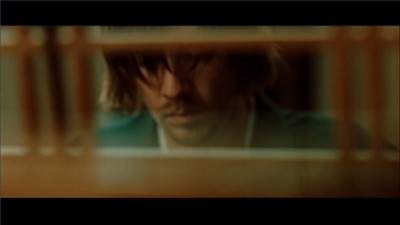 |
The screenplay, written by Harald Rosenløw-Eeg, riffs on a story that'll seem familiar to those who have seen the likes of American History X or Boy A, with melancholy happenstance echoing Mean Creek as its driving force. It's about Jan (Pål Sverre Valheim Hagen), otherwise known to us by his middle name Thomas, who has recently taken a job as an organ player after his release from prison. His reason for being in jail is somewhat murky, but we're aware that an accident along the bank of a river made him, and his friend, responsible for the death of a young boy. We're led to believe that the church had its reluctance in taking in the ex-convict until he works a little finger magic on the organ's keys, impressing with his talent and his ability to immediately start work. Along the way, he timidly befriends a female priest and her son, a boy of the same age as his "victim".
Troubled Water transitions into a portrait of coping with a half-caused sin, an event that leaves us wondering whether Thomas should or shouldn't be held responsible for something he did when he was younger. He strikes a chord of empathy with us, though, mostly because on his timid, affected disposition. There's a sense of both time-weathered numbness and vivacity about him, conflicting as expected from a man somewhat wrongfully put in prison. Personal interpretations of his guilt will differ because of the focal event's heartbreaking nature, shown to us in fragmented flashbacks throughout the film, and that complexity adds to the fervor within Poppe's film. As we see Thomas shed his cast from a prison injury, swallow down the pain, and attempt to dazzle church folk with his talents before being dismissed from the opportunity, he -- a presupposed child killer -- earns our reserved fondness.
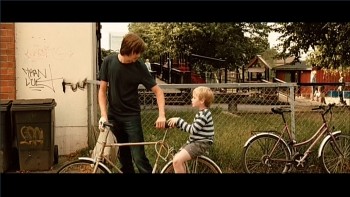 | 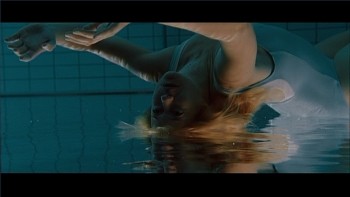 |
As his presence around the church, and around a child, slowly builds into a stirred-up wasp's nest of understated intensity, Troubled Water falls back on authentic, sparingly inventive cinematography from John Christian Rosenlund (Factotum) and resonant musicality to uplift the gloomy tension. Listening to Thomas play in the echoing church gives us a glimpse into his changed personality, showing an artful and tranquil side to him that eases our discernment of his troubled past. Thomas, though, isn't really a suspect character in our eyes, mostly a kid who's made a mistake and paid dearly for it; the cinematography, as it follows him through the small city where he works, neutralizes any threatening qualities about him amid clean lines, dimly-lit apartments and the bustling normalcy of a regular, low-key life. The docile visuals also aid in our earnest absorption of his rediscovery of love, his purpose in life, and, in a roundabout way, a controlled reconnection with the will of a higher power.
Erik Poppe and his screenwriter might present Thomas' re-socialization at the beginning with sophistication, but it's only once the duality of Troubled Water enters into the picture that its raw intensity begins to take shape. We also see the child's "disappearance", and Thomas' release, in the eyes of the child's mother Agnes, a now-adoptive parent who's on the cusp between absolution and an irrational sense of anger over her lost child. Played with bleeding, wide-eyed passion by Trine Dyrholm, she sees Thomas in church and around children, only aware of him as a murderer and not of the context of his growth -- pains learned in prison, a developed affection for the nurse's child, and his coming-to-grips with the accident. An underlying glimpse into maternal instinct and reopened wounds sets in motion with her emotional stirring, giving us two points of view coarsely grinding against each other. Poppe doesn't ask us to take sides on the matter, though the actions of one will steer our focus; instead, he simply orchestrates purity of rage and torment within the mother's fearful instinct, allowing us to witness the events through two sets of eyes without attempting to either directly placate our provoke our outlook.
Troubled Water boils to an ardent, thematically complex turn of events in the finale that plays with the irrationality of a scorned mother's pain. Resent, misunderstanding, justice, and forgiveness all attempt to swirl together in this potent culmination, one with reopened wounds and fresh woes alike surfacing amid the collision between Thomas and Agnes. It reaches into a chaotic blitz involving all the puzzle pieces fitted against each other from the beginning, somehow reaching a cathartic conclusion between a mother's loss and a convict's need to vanquish the last demons that followed him from his life-altering past. Moreover, there's a sense of tension achieved in the final moments that paints broad strokes of emotional suspense against Thomas' story. We hope all along for his full atonement, and the way it's achieved -- with water rushing in the background, just like the film's core event -- is breathtaking. This is a film that's not to be missed.
The DVD:
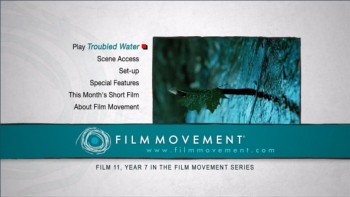 | 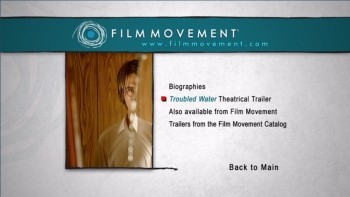 |
Note: Troubled Water arrives as the eleventh (11th) installment of Film Movement's seventh (7th) year of its program.
Video and Audio:
Simply to have Norway's Troubled Water in a 16x9-enhanced presentation with accurate colors and a stable print is a gift, though Film Movement's digital presentation does have a few inconsistencies. The image is overall exceedingly flat in regards to dimension, very artificial looking and sporting sporadic blocking and persistent aliasing. It does offer the film in its correct 2.35:1 aspect ratio, however, and never left me unimpressed with the palette tones in close-ups, near the river bank, and in the dim interior shots, so the quibbles with the merely serviceable quality can be overlooked for the opportunity to see the film.
Audio comes in a more satisfying Dolby 2.0 arrangement, which preserves the beauty of the film's music-based essence well. When the organ's notes aren't filling our eardrums, a delicate score matches poetic visuals -- and it remains buoyant and satisfying. Verbal clarity remains distortion free and clear, though the exactly clarity of the language can't be attested -- since I don't speak the language. Some separation occurs across the two channels, but the main point behind this front-heavy track is to present the music and dialogue to an ample degree, and it does. Subtitles are available in optional English text.
Special Features:
As with most of Film Movement's other installments, the DVD itself comes with only a small handful of special features. Some Biographies and a Trailer accompany the film, while the month's short picture -- The Kolaborator (dir. Chris Bessounian), an ambitious and forceful piece -- rounds out the supplements.
Final Thoughts:
Troubled Water is a challenging, suspenseful, beautiful and ultimately rewarding drama from Norway that zeroes in on the complex nature of atoning for past events. Fraught performances mix with an evocative cinematic aesthetic, creating a complete glimpse into the minds of the two individuals haunted by a exuberant mistake from one's youth. Film Movement continues their film-of-the-month with a workable presentation of a great film, an easy one to Recommend -- though the audiovisual treatment certainly could've been tightened. The DVD could be better, but the film's a real overlooked gem and unquestionably worth seeing.
|
| Popular Reviews |
| Sponsored Links |
|
|
| Sponsored Links |
|
|
| Release List | Reviews | Shop | Newsletter | Forum | DVD Giveaways | Blu-Ray | Advertise |
|
Copyright 2024 DVDTalk.com All Rights Reserved. Legal Info, Privacy Policy, Terms of Use,
Manage Preferences,
Your Privacy Choices | |||||||









